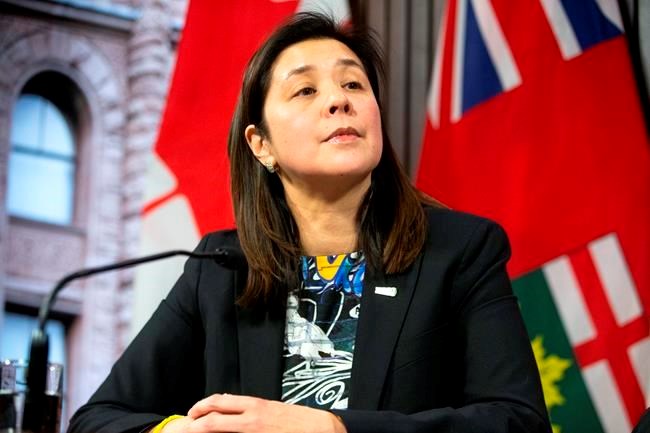TORONTO — Ontario has warned Toronto Public Health's top doctor to drop the city's drug decriminalization application or prepare for the province to "explore all options" available.
But Dr. Eileen de Villa, the city's medical officer of health, is defending the decriminalization bid, saying the public health unit is prioritizing saving lives.
Health Minister Sylvia Jones and Solicitor General Michael Kerzner wrote a letter to de Villa on Thursday that said the province is "100 per cent opposed" to Toronto's more than two-year-old application.
"Under no circumstances will our government ever support your request, which would only add to crime and public drug use while doing nothing to support people struggling with addiction," Jones and Kerzner wrote.
The letter follows Premier Doug Ford's pledge to fight the decriminalization request "tooth and nail."
De Villa said, however, that the decriminalization application was aimed at addressing an epidemic.
"Decriminalization is one tool, supported by the best available evidence, to address the drug toxicity epidemic," she wrote in a statement.
Opioids, predominantly fentanyl, have ripped across Canada over the past decade, killing thousands every year. In Toronto, more than 500 people die from drug toxicity each year.
"These deaths are preventable," de Villa said. "I support increased access to treatment and harm reduction services, which are life-saving and serve as the front door to health care and other supports."
Toronto's public health unit filed an application with Health Canada in early 2022 to decriminalize the possession of illegal drugs for personal use.
Rescinding that application would require direction from the city's Board of Health, de Villa said.
The Ontario ministers said the results of a "disastrous" pilot program in British Columbia prove that a decriminalization approach does not work.
"Instead, it encourages dangerous behaviour in public spaces, victimizes innocent people and undermines law enforcement's ability to protect our communities," Jones and Kerzner wrote.
The B.C. government recently received federal approval to recriminalize public drug possession, a major climb down for the first-of-its-kind pilot in Canada.
Kerzner said the province does not want a reproduction of what happened in B.C.
"We don't want to have a failed experiment happen right here in our Toronto," he said. "We don't want more drugs in our parks. We don't want more drugs in our streets."
Prime Minister Justin Trudeau has said Toronto does not have an "active" application, while the city's health unit has said its application remains with Health Canada amid ongoing discussions.
Decriminalization has been publicly backed by Toronto officials since at least 2018 for its stated goal to reduce stigma and treat the overdose crisis as a health issue, rather than a criminal one. Criminalizing drug possession, Toronto's application says, only makes it harder for people who use drugs to get support.
The city sent a preliminary request to Health Canada in January 2022 and, after more consultations, updated its submission in March 2023. The proposal calls for decriminalization to be paired with a host of more direct public health responses, including scaled-up harm reduction and mental health services.
The provincial New Democrats support decriminalization.
"What public health is trying to do is they are trying to keep the people alive long enough to be able to link them to care so that they can have the support they need," said France Gelinas, the NDP's health critic.
The Greens also support decriminalization while the Ontario Liberal Party does not.
"Focus on prevention, focus on treatment," said John Fraser, the Liberal parliamentary leader. "For safe consumption sites, they are part of the treatment."
The Ontario government, meanwhile, has been reviewing all treatment and consumption sites in the province and said that work is now complete. It said it will enact "enhanced accountability measures," with the health minister's office and would provide more details in a few weeks.
The province's position is also at odds with Ontario's chief medical officer of health, Dr. Kieran Moore.
He has recommended Ontario decriminalize simple possession of unregulated drugs and make safer supply accessible to reduce the number of people in the province dying from preventable opioid overdoses each year.
The health minister did not endorse Moore's recommendation.
Last fall, the province paused approving new supervised consumption and treatment sites as it conducted its review.
The province also tasked Unity Health Toronto with a comprehensive review of a consumption site in Toronto's east end after a 44-year-old mother of two was killed by a stray bullet nearby after a fight between three men.
Police have laid charges against several people in the death of Karolina Huebner-Makurat, including accessory after the fact and obstructing justice counts laid against a woman who worked at the South Riverdale Community Health Centre.
This report by The Canadian Press was first published May 16, 2024.
Liam Casey, The Canadian Press

